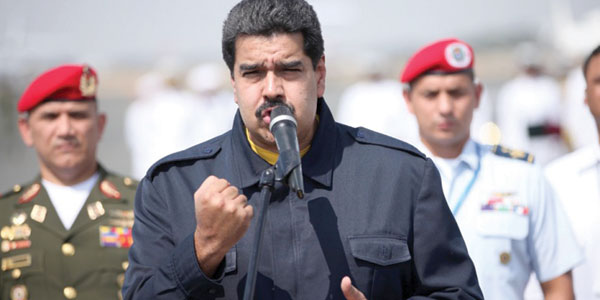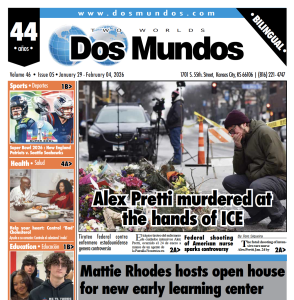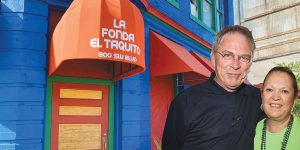No hay nada que pueda parar a un venezolano enojado, y actualmente hay muchos venezolanos “hasta la coronilla”.
¿Por qué? La lista es larga: la inflación más alta del continente; un dólar oficial con una paridad falsa; índices de criminalidad similares a los de zonas de guerra; gran corrupción; y la preocupación por un fraude mayúsculo, o “chanchullo”, en las próximas elecciones para la Asamblea Nacional del 6 de diciembre.
Con la mayoría de los medios de comunicación tomados por los post-Chavistas, se oyen pocas críticas al gobierno en radio y televisión. Es un “bozal de arepa”. Hay mucha censura y autocensura. Pero, como venganza, los venezolanos se han inventado un maravilloso lenguaje que describe a un país al borde del precipicio.
Venezuela está dividida entre “pitiyanquis” y “rojos rojitos”. Los términos medios han desaparecido. Si te opones al gobierno del gobernante Nicolás Maduro eres, según su definición, un “escuálido”. Pero los que siguen en el poder y se han enriquecido a sus anchas son llamados “boli-burgueses”; son los nuevos ricos de la revolución bolivariana (iniciada por el difunto líder Hugo Chávez en 1998).
Los líderes Chavistas han demostrado que se puede ser, al mismo tiempo, socialista y multimillonario en dólares. (Con la actual inflación cualquiera puede ser millonario en bolívares.) Por eso les llaman “robo-lucionarios” a los que han multiplicado inexplicablemente sus “macundales”.
Hay todo un diccionario para describir sus componendas y corruptelas. Por lo tanto no es extraño tener que “echarse unos palos” con los burócratas maduristas y “pagar peaje” antes de negociar un “guiso”. Y siempre, claro, con whisky.
Venezuela, por razones que aún no comprendo, es uno de los principales consumidores de whisky del mundo. Al venezolano lo identificas en Londres, Buenos Aires o Tokio por la peculiar manera en que revuelve el hielo de su whisky con el dedo.
La corrupción es el nombre del juego. Muchas veces hay que “mojarle la mano” al “conchudo” funcionario público que da un permiso o un servicio que debería ser gratuito. Siempre ayuda estar “enchufado” o ser un “chupamedias” de alguien que tiene su pedacito de poder: el “tracalero” que se beneficia de los dólares preferenciales, el que sella el pasaporte o el del rinconcito en Petróleos de Venezuela.
No importa cuanto “billullo” tengas en Venezuela. Ante la creciente escasez de productos básicos, es preciso “bachaquear” o hacer filas interminables. Y siempre hay que estar alerta para que nadie te vaya a “caribear” o engañar.
La vergüenza se ha ido perdiendo. Al burócrata “pata’e rolo” ya no le importa nada, ni que le griten “mala-cama” o “toripollo”. Actúa con la arrogancia del “muelero” porque sabe que está por encima de la ley. Los post-Chavistas se creen superiores. Sobrevivieron a la muerte de su líder histórico, demostraron que sí hay Chavismo sin Chávez y hasta califican de “manganzones”, buenos para nada, a los que creyeron que la oposición podría desatornillarlos del poder.
Los opositores — en esas pláticas a vela durante los cada vez más frecuentes apagones — consideran que Maduro es un “batequebra’o”. Pero esto no ha evitado que algunos artistas y cantantes “pasteleros” hayan “saltado la talanquera” y pasado de las guarimbas de la oposición al griterío del oficialismo en un abrir y cerrar de chequeras.
Esta hiriente creatividad en el uso del lenguaje no es exclusiva de los venezolanos. En el 2001 escribí un artículo llamado “Come-Solos y Come-Siempre”, sobre los abusos de una parte de la clase política dominicana. Pero el artículo, en buena parte, se sostiene todavía, y refleja la maravillosa inventiva del pueblo dominicano para describir a algunos de sus líderes más corruptos; unos roban solos y otros roban siempre. También, los nicaragüenses se inventaron el personaje del Güegüense para decirle al patrón con humor y sorna lo que no se atrevían a decirle en su cara.
Como los albures mexicanos, en Venezuela los insultos — cargados de humor y bilis — se dirigen a los de arriba. Le ha salido lo duro a Maduro (aunque vea pajaritos, se caiga de la bicicleta y diga penes por panes). Tan duro como esos dulces “rompe muelas”. Pero los venezolanos traen la lengua desatada y lo “jurungan” todo.
La mejor venganza, sin embargo, no está en las palabras sino en los votos. Las encuestas sugieren que la oposición va a ganar una mayoría en la asamblea. Sin embargo, yo todavía tengo mis dudas: No confío en ningún gobierno que cuenta sus propios votos.
Pero, pase lo que pase, en Venezuela la calle ya votó con la lengua — y el cambio se oye.
(Jorge Ramos, periodista ganador del Emmy, es el principal director de noticias de Univision Network. Ramos, nacido en Mexico, es autor de nueve libros de grandes ventas, el más reciente de los cuales es “A Country for All: An Immigrant Manifesto.”)
Venezuela: Change Is Coming
By Jorge Ramos
It seems that Venezuela doesn’t exist for the U.S. presidential candidates. Neither party’s hopefuls mention the South American nation during political debates, and though Venezuelan activists are battling to expand democracy and human rights protections, no U.S. candidate has presented a plan to support their efforts.
Understandably, the candidates are focused on the aftermath of the terrorist attacks in Paris and the Islamic State group’s threats against the U.S. But as Venezuela gears up for a parliamentary election on Dec. 6, American politicians and people should be aware of the major challenges people are facing there.
While polls suggest that the opposition could win a majority in the National Assembly for the first time in 16 years, Venezuelan President Nicolas Maduro’s administration has refused to allow international observers monitor the election. This is, of course, deeply troubling, since Maduro’s government controls the agency that counts the ballots.
Already the president has signaled that no matter what, the right party will win. Maduro even declared a few weeks ago that in the event that the opposition won control of the assembly, “under no circumstances would I surrender our revolution,” and noted that in that “hypothetical” situation, he would just “govern the people in a civilian-military alliance.”
Despite these declarations, the Venezuelan opposition hasn’t lost hope. Politicians continue to campaign and spread their message, knowing that real change can occur only if they manage to capture the assembly — somehow.
Unfortunately for them, this is a huge mountain to climb. Maduro — like his late predecessor, Hugo Chávez — has no experience in power-sharing. He is a strongman, and that’s the only political style he’s familiar with.
Meanwhile, a full-blown crisis of governability continues to affect Venezuelans’ daily lives: The country has the highest inflation rate on the continent; crime rates rival those of a war zone; and the political classes continue to be thoroughly corrupt. In fact, just a few weeks ago, two members of Maduro’s family were arrested in Haiti and flown to the U.S. The men, nephews of first lady Cilia Flores, were charged with conspiring to bring 1,760 pounds of cocaine to the U.S. Of course, Maduro’s administration censored the news in Venezuela and painted the arrests as just another attack from the empire up north.
In addition, Venezuela is growing more isolated. Cuba, its historical ally, recently resumed diplomatic relations with the U.S., apparently without the blessing of Caracas. And falling oil prices have greatly affected Venezuela’s standing in global matters and hindered the government’s ability to hand out aid to the nation’s most impoverished areas, where the administration’s electoral base lives.
But while the regional influence that Chavez enjoyed for many years has been lost, Venezuela’s authoritarian structure is still very much in place. Many of Maduro’s most influential opponents are either locked in prison or living in exile. For instance, despite international pressure to release him, opposition leader Leopoldo López has been imprisoned for more than a year after being sentenced to 13 years for allegedly instigating a rebellion.
A prosecutor in the case against López, Franklin Nieves, fled Venezuela for the U.S. earlier this year and has said that the Maduro administration pressured him to fabricate charges against López and threatened to jail him if he refused. It was all a “farce,” Nieves has admitted. And while the National Assembly could take up legislation that would free López, for now it’s completely controlled by politicians allied with the Maduro administration.
Sadly, while all of this tumult is happening in Venezuela, presidential candidates in the U.S. have remained silent about the situation there. Their attention rarely turns to matters south of the border.
This is nothing new, of course: Both President George W. Bush and President Obama promised during their respective campaigns that they intended to make Latin America a priority of their foreign policy, but the results have been mixed.
The fact is that only Venezuelans can change Venezuela, and the nation will have a momentous chance to start on Dec. 6. But they will need our support. All of our support.
(Jorge Ramos, an Emmy Award-winning journalist, is the host of Fusion’s new television news show, “America With Jorge Ramos,” and is a news anchor on the Univision Network. Originally from Mexico and now based in Florida, Ramos is the author of nine best-selling books, most recently, “A Country for All: An Immigrant Manifesto.” Email him at jorge.ramos@nytimes.com.)











